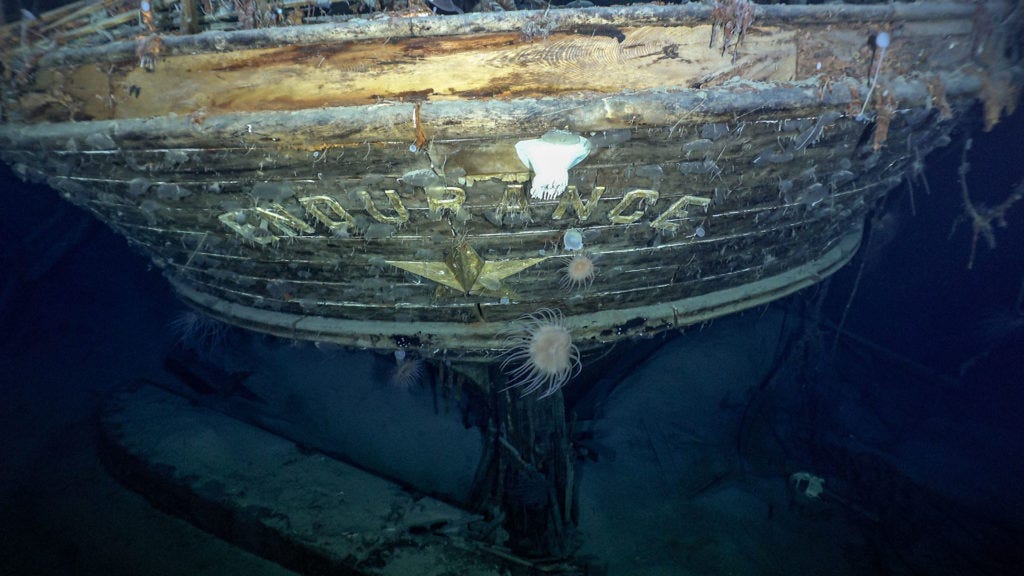The glad ship is gone
She hides in the dim distance
Men like Ernest Shackleton may sleep, but they never die. There are some figures of history, to quote Richard Dimbleby, ‘whose deeds and words will live as long as the English tongue is spoken.’
Public history, though currently riven by revision and revulsion, will always have space for them. The nature of the decline of Britain after World War Two is such that we will always yearn for a Britain - and Britons - powerful enough to find difficulties shameful to notice or acknowledge. As I wrote for an upcoming piece in Porridge, ‘the war was both a high watermark for British power and a catafalque for Great Britain, capital G, capital B. Pre-war, Britain was the princeps amongst nations - no longer the unequalled global hegemon, but still retaining her pride, military strength and an unrivalled global reach. After the war came a precipitous decline to which Britons have still to acclimatise.’
The element of our pre-war national personality that Shackleton and his ilk - Edmund Hilary, Scott of the Antarctic - represent is our capacity to endure, to shoulder a burden as manfully as Christ shouldered the Cross. In a world where the niceties of survival have been gladly passed from the hands of the individual to that of the state, we are unfamiliar with men cut from this cloth. They had no prophetic leader, no miracle of faith, no sudden reinforcement. They had only themselves. It doesn’t matter that Scott or Shackleton ultimately failed - victories and defeats are meaningless. Endurance is its own achievement.
Adversity introduces us to ourselves; we ponder if, in their situation, we would have crumbled or, as they did, become as sure as a rock which by its very nature repels the froth and fury swirling around it. That is why we are so fascinated by them, and why $10million has been spent finding a ship that cannot, will not, and should not ever be moved. Endurance 22 is the most magnificent and easily defensible waste of money I have seen in years. To see that transcendent, noble hulk sat on the bottom, her darkest moments now traded for a bright eternity, makes the hear soar.
To celebrate its’ rediscovery, it is time we honoured another figure of Shackelton’s ilk - if not his stature. After Shackleton reached South Georgia, three attempts to return to Elephant Island to rescue the remaining crew of Endurance were thwarted. The whaler The Southern Sky, the trawler Instituto de Pesca No.1 and the sealer Emma were prevented from approaching Elephant Island by pack ice. After being authorised to escort and tug Emma home after her attempt, Luis Alberto Pardo Villalon (1882-1935) was then further authorised by Chilean President Juan Luis Sanfuentes to make a solo attempt.
His ship, the Yelcho, was totally unsuited to the task. Built in 1906 in Glasgow and commissioned into the Chilean Navy two years later, the 120-ft. steam tug was small, had no radio, no suitable heating system or any electric lighting. Pardo sailed out of Punta Arenas with a crew of volunteers on 25 August at the very height of the Antarctic winter - despite the fact that the ship was also single-hulled, which rendered it particularly vulnerable to the pack ice that had scuppered the previous attempts.
He was then faced with the Drake Passage, the body between Cape Horn and the South Shetland Islands. Throughout history, sailors have opted for the 600km-long passage through the clustered network of islands and fjords of the Straits of Magellan rather than taking on "the most powerful convergence of seas". To this day the intense winds, icebergs and swelling sea means that it is considered one of the most dangerous voyages a ship can make. Pardo skilfully navigated his way through in a violent winter storm. He then found Elephant Island - free from pack ice, but covered in heavy fog. Unable to see land, he navigated by the echo from the ship's siren, bought the boat safely in and rescued the 22 remaining men of Endurance. They been on the island for more than three months.
In a letter to his father before sailing for Elephant Island, Pardo wrote; 'The task is great, but nothing frightens me... If I fail and die, you will have to take care of my Laura and my children, who without any support except for yours. If I have success, I have done my duty as a seaman humanitarian and as a Chilean. When you read this letter, or your child will be dead or have reached Punta Arenas with the castaways. I will return not alone.' As with Shackleton himself, the path of duty lay before Pardo. Little did it trouble him that it ran through dark shadows.
Pardo’s story of dedication to the rescue of the men is, of course, lesser than Shackelton’s. But when it comes to heroism, qualitative judgements do not apply - all that matters is to recognise the chance when it is offered. They also serve who only stand and wait.
The Yelcho succeeded thanks to Pardo’s dedication, skill and bravery. He was showered with public acclamation, awards and honours at home, the British Government at the time - Asquith’s Coalition Ministry - voted Pardo a financial reward. As befitted a gentleman of the age, he turned it down. It is time to right that wrong. I’ve started a petition to have the Government give Prado a posthumous honour, and you can sign it here.



